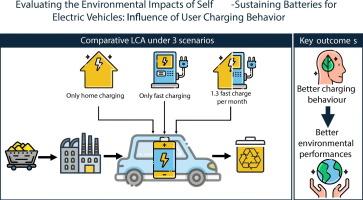评估电动汽车自持电池对环境的影响:用户充电行为的影响
IF 9.6
1区 环境科学与生态学
Q1 ENVIRONMENTAL STUDIES
引用次数: 0
摘要
随着汽车电气化程度的提高,优化充电时间变得至关重要。然而,快速充电会加速电池退化,缩短电池寿命。为了应对这一挑战,电池和冷却系统正在开发增强容量,以支持快速充电。本文使用比较摇篮到坟墓的生命周期评估来评估这种改进系统的环境影响。在夜间充电和快速充电两种情况下,将增强型系统的性能与市场上现有的参考系统进行了比较。另外还模拟了一个场景,以反映每月快速充电次数的限制,避免更换电池。虽然大多数现有的研究都着眼于快速充电的影响,但它们通常没有根据个人用户的充电选择来定义场景,因此也就没有考虑到快速充电和慢速充电之间的潜在切换。在本研究中,功能单元行驶1公里,使用电池级老化测试的结果计算电池更换需求。还进行了敏感性分析,以评估更低碳的电力组合的影响。在夜间充电情况下,对于生态毒性淡水,参考系统表现更好。在快速充电场景下,改进后的系统在所有影响类别中都优于其他系统。使用脱碳电力组合,参考系统在更多类别的夜间充电场景中表现更好。总体而言,研究表明,两种系统的比较环境结果在很大程度上取决于收费方案。本文章由计算机程序翻译,如有差异,请以英文原文为准。

Evaluating the environmental impacts of self-sustaining batteries for electric vehicles: Influence of user charging behaviour
Optimizing charging time has become essential with the increasing electrification of the vehicle fleet. However, fast charging can accelerate battery degradation, reducing the battery's lifespan. To address this challenge, batteries and cooling systems are being developed with enhanced capacities to support fast charging. This paper evaluates the environmental impacts of such improved systems using a comparative cradle-to-grave life cycle assessment. The performance of the enhanced system is compared to that of a reference system currently available on the market, under two scenarios: an overnight charging scenario and a fast-charging scenario. An additional scenario is modeled to reflect a limit on the number of fast charges per month to avoid battery replacement. While most existing studies that include battery degradation look at fast-charging effects, they often do not define scenarios based on individual user charging choices and therefore, potential switch between fast and slow charging. In this study, the functional unit is 1 km driven, and the need for battery replacement is calculated using results from ageing tests at the cell level. A sensitivity analysis is also conducted to evaluate the influence of a more decarbonized electricity mix. In the overnight charging scenario, for Ecotoxicity Freshwater, the reference system performs better. Under fast-charging scenario, the improved system outperforms the other across all impact categories. With a decarbonized electricity mix, the reference system performs better across more categories in the overnight charging scenario. Overall, the study demonstrates that the comparative environmental results of the two systems depend strongly on the charging scenario.
求助全文
通过发布文献求助,成功后即可免费获取论文全文。
去求助
来源期刊

Sustainable Production and Consumption
Environmental Science-Environmental Engineering
CiteScore
17.40
自引率
7.40%
发文量
389
审稿时长
13 days
期刊介绍:
Sustainable production and consumption refers to the production and utilization of goods and services in a way that benefits society, is economically viable, and has minimal environmental impact throughout its entire lifespan. Our journal is dedicated to publishing top-notch interdisciplinary research and practical studies in this emerging field. We take a distinctive approach by examining the interplay between technology, consumption patterns, and policy to identify sustainable solutions for both production and consumption systems.
 求助内容:
求助内容: 应助结果提醒方式:
应助结果提醒方式:


